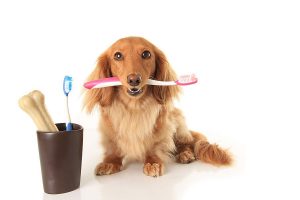Posts Tagged ‘brush your dog’s teeth’
When And How To Brush Your Dog’s Teeth
 Eighty percent of dogs show signs of gum disease by the time they are two years old. The best cure for these dental issues is early prevention. Once plaque has formed on the teeth, the only way it can be removed is with a mechanical cleaning. Without brushing, this plaque build-up can cause gum disease, bad breath, and tooth decay.
Eighty percent of dogs show signs of gum disease by the time they are two years old. The best cure for these dental issues is early prevention. Once plaque has formed on the teeth, the only way it can be removed is with a mechanical cleaning. Without brushing, this plaque build-up can cause gum disease, bad breath, and tooth decay.
You can help your dog’s teeth by beginning dental maintenance early. In order to keep your dog comfortable while brushing its teeth, wait until your dog has all of their adult teeth before using a toothbrush. This should be around six months. In order for your dog to get comfortable with a toothbrush, you should start brushing your dog’s teeth as early as possible.
To start brushing your dog’s teeth, begin by gently rubbing your puppy’s gums with your finger. Ease into it by massaging their gums regularly while you are snuggling them. Once they are used to your finger, switch to a soft rubber brush that fits on your fingertip. Only use toothpaste that is specifically made for dogs. This comes in flavors like beef, chicken, banana, and mint. You can find this at your local pet store. Once your dog has their adult teeth, begin a weekly brushing regimen and work your way up to three to four times per week.
To begin brushing your dog’s teeth, make sure that you are in a position where your dog is comfortable. You should try kneeling or sitting in front/side of them in order to not appear threatening. If your dog seems upset, stop and try again later. Prep your toothbrush with doggy toothpaste and use small circular motions. Focus on the plaque. Slight bleeding may occur, but if heavy or ongoing bleeding occurs, stop. This might be a sign of too aggressive brushing or even gum disease. Call your vet for advice. Be sure to be reassuring while brushing your dog’s teeth.
Keep the mood light and remind your dog that they are a good boy/girl. End the brushing session with their favorite treat or extra attention.
Other ways to maintain dental wellness is to provide chew toys. Teething is a part of puppy-parenting. Plenty of specially designed puppy toys will be handy in managing this teething. Mildly abrasive foods and toys help keep your dog’s teeth clean. It is important to note that you should avoid natural bones, antlers, dried cow hooves, hard nylon toys, and large rawhide toys with puppies. These are hard enough to fracture delicate puppy teeth.
Lastly, be sure to schedule dental check-ups with your vet. Dogs should go to the vet twice a year for a dental exam. They might need their teeth cleaned annual. If your pup’s breath is especially stinky lately, you should call your vet. Bad breath might be a sign of dental problems or even gum disease. As always, don’t hesitate to contact our office with questions.
